| Season Twenty-Four (1987): Days Like Crazy
Paving |
| Companions and Recurring Characters |
|
Ace was a troubled teenager from Perivale
in London who met the Doctor after an accident teleported her to
Iceworld in the far future.
Sophie Aldred (bio) made her first appearance as Ace
in Dragonfire (November 1987) and
her last in The Power Of The
Doctor (October 2022).
|
|

|
|
A replacement for Eric Saward was ultimately found in the form of Andrew Cartmel (bio), who took over the script
editor's reins as the season was nearing production. The team of Cartmel
and John Nathan-Turner would remain in place throughout the remaining
three seasons of the original Doctor Who series.
|

|
|
Time And The Rani by Pip and Jane Baker,
directed by Andrew Morgan
The Rani attacks the TARDIS, forcing it to land on Lakertya. There, she
renders the newly-regenerated Doctor amnesiac and convinces him to help
her with an experiment involving an asteroid made of strange matter.
Melanie meets Ikona, one of the native Lakertyans oppressed by the Rani.
Together, they navigate the twin menaces of the Rani's henchmen, the
bat-like Tetraps, and her lethal bubble-traps. Mel is able to restore
the Doctor's memory. Together they discover that the Rani has been
collecting geniuses from throughout history to use in her experiment --
a fate she also has planned for the Doctor.
|
The Doctor is mortally wounded when the Rani captures the TARDIS, and
regenerates.
|
|---|
|
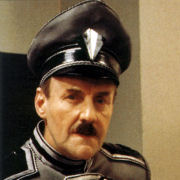
|
|
Paradise Towers by Stephen Wyatt,
directed by Nicholas Mallett
The Doctor and Mel go to Paradise Towers for a holiday, only to find the
famed condominium complex in a state of deterioration. Long ago, the
adults went off to fight a war and never returned. Now all that remain
are the Kangs, gangs of wild teenaged girls; the Rezzies, cannibalistic
crones; the Caretakers, rules-obsessed old men who ostensibly look after
the Towers; and Pex, who was too scared to go to war. But something has
turned the cleaning robots homicidal, and now they're picking off the
humans one by one... while the insane Chief Caretaker tends to something
voracious in the basement.
|
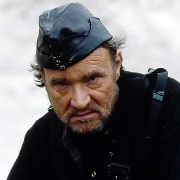
|
|
Delta And The Bannermen by Malcolm
Kohll, directed by Chris Clough
The Doctor and Melanie win a vacation to Disneyland in the Fifties,
accompanying a group of alien Navarinos on a time-travelling tour bus.
Also aboard is Delta, the last of the Chimerons, who is being hunted by
the genocidal Bannermen and their brutish leader, Gavrok. The tour bus
collides with a satellite being tracked by the CIA, and crashlands near
a holiday camp in Wales. There, a mechanic named Billy falls in love
with Delta, to the chagrin of tomboy Ray. But amidst the merriment, the
Doctor discovers that a mercenary has alerted Gavrok to Delta's
whereabouts... and the Bannermen are on their way.
|
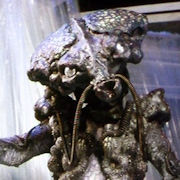
|
|
Dragonfire by Ian Briggs, directed by
Chris Clough
The TARDIS lands on the frigid planet Svartos, where the Iceworld colony
is ruled by the pitiless Kane. There, the Doctor and Melanie meet a
time-displaced teenager from Earth called Ace, and are reunited with
intergalactic rogue Sabalom Glitz. Glitz is searching for the treasure
of the legendary Dragon which is supposed to dwell in the lower levels
of Iceworld, unaware that he is doing so at Kane's behest. When Ace
refuses Kane's offer to become one of his zombie-like mercenaries, she
and Mel flee into the Iceworld tunnels, where Kane's millennia-old
secrets wait to be discovered.
|
Mel decides to travel with Glitz, while Ace leaves Iceworld with the
Doctor.
|
|---|
|
|
Following Colin Baker's refusal to return for a regeneration story, the
season began with the debut of Sylvester McCoy as the Seventh Doctor.
Although his comedy background invited intense criticism from some
quarters, McCoy quickly helped Doctor Who establish a renewed
sense of stability. With script editor Andrew Cartmel actively
recruiting a new cohort of young writers, and Sophie Aldred's Ace
putting a more modern spin on the role of the companion, the result was
a much-needed reinvigoration by season's end.
|
| Season Twenty-Five (1988): Unfinished
Business |
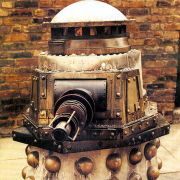
|
|
Remembrance Of The Daleks by Ben
Aaronovitch, directed by Andrew Morgan
In 1963 London, the Doctor and Ace encounter a military taskforce led by
Group Captain Gilmore and his scientific adviser, Prof Rachel Jensen.
They are tracking Dalek activity, concentrated around Coal Hill School
and the junkyard at Totter's Lane. The Doctor realises that the Daleks
are seeking the Hand of Omega, a powerful Gallifreyan relic he left
behind in his first incarnation. Ace is befriended by Sergeant Mike
Smith, unaware that he is involved with a sinister organisation led by
Ratcliffe. The Doctor believes he has events under control... until he
discovers that he is actually facing not one, but two rival Dalek
factions.
|
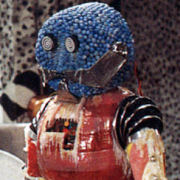
|
|
The Happiness Patrol by Graeme Curry,
directed by Chris Clough
The TARDIS arrives on Terra Alpha, where the Doctor intends to
investigate the iron-fisted rule of Helen A. She has declared negative
emotions to be unlawful, and subject to penalties as severe as death.
Her edicts are enforced not only by a crack police force known as the
Happiness Patrol, but also by a sadistic robot made out of sweets called
the Kandy Man. Ace finds an ally in Susan Q, a member of the Happiness
Patrol who has become disillusioned with the false jollity of Helen A's
regime. Meanwhile, the Doctor befriends a blues player named Earl, and
together they confront the horrors of the Kandy Man's Kandy Kitchen.
|
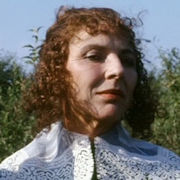
|
|
Silver Nemesis by Kevin Clarke, directed
by Chris Clough
A meteor crashlands in 1988 Windsor, carrying a mysterious statue called
Nemesis. It was fashioned in 1638 by the wicked Lady Peinforte from a
living metal called validium, which was once Gallifrey's last line of
defence. Two artefacts are required to activate the Nemesis statue: its
bow, now in the possession of a Neo-Nazi called De Flores, and its
arrow, which Lady Peinforte has transported through time to 1988. But De
Flores and Peinforte aren't the only ones whom the Doctor and Ace must
stop from obtaining the validium: the Cybermen have also arrived,
determined to seize the power of Nemesis for themselves.
|
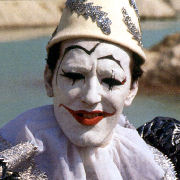
|
|
The Greatest Show In The Galaxy by
Stephen Wyatt, directed by Alan Wareing
The Doctor takes the TARDIS to Segonax to see the famed Psychic Circus.
En route, they meet the pompous explorer Captain Cook and his enigmatic
companion, Mags. Together, they discover that the Greatest Show In The
Galaxy has become something macabre: its founder, Kingpin, has
disappeared; the callous Chief Clown deals violently with anyone who
tries to flee; and ticketholders are pressed into service under the big
top, where they must entertain a sinister family -- or die. Ace is
pursued through the labyrinthine tents by the clowns she dreads, while
the Doctor and Mags search for the terrible secret at the heart of the
Circus.
|
|
Doctor Who's volatile ratings took a turn for the better in 1988,
as the programme marked a quarter-century on the air. Abetted by Andrew
Cartmel and an inventive young cadre of writers, Sylvester McCoy was
evolving his Doctor in darker, less cartoonish directions. But the shine
of the silver anniversary would fade quickly...
|
| Season Twenty-Six (1989): Journey's
End |
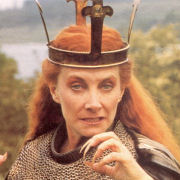
|
|
Battlefield by Ben Aaronovitch, directed
by Michael Kerrigan
Near the village of Carbury, the Doctor and Ace meet Brigadier Winifred
Bambera of UNIT, who is overseeing a missile convoy. They are attacked
by knights from another dimension in pursuit of the noble Ancelyn, who
recognises the Doctor as the sorcerer Merlin. Stranger still, a
spaceship hidden beneath the waters of the nearby Lake Vortigern
conceals the fate of the legendary King Arthur. But the Doctor may have
met his match when Mordred, commander of the knights, summons his
mother, the mighty witch Morgaine. Fortunately, Brigadier
Lethbridge-Stewart has arrived to stand at the Doctor's side one last
time.
|
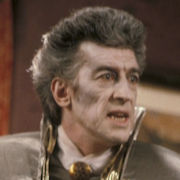
|
|
Ghost Light by Marc Platt, directed by
Alan Wareing
When Ace was younger, a derelict mansion in Perivale called Gabriel
Chase scared her so badly that she burned it down. The Doctor takes
her back to Gabriel Chase in 1883, when it is the home of Josiah Samuel
Smith, who is conducting research into evolution against the wishes of
the Church. Gabriel Chase hides many secrets: the basement is really a
stone spaceship where a creature named Control is imprisoned, an insane
big game hunter called Redvers Fenn-Cooper prowls the halls, and Smith
himself is rapidly evolving. When Ace releases a powerful entity called
Light, the house's dark history will be revealed.
|
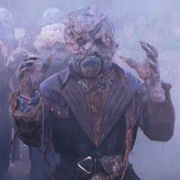
|
|
The Curse Of Fenric by Ian Briggs,
directed by Nicholas Mallett
The Doctor and Ace travel to a seaside British military base during
World War II. It is home to the Ultima Machine, a powerful codebreaker
which Dr Judson is using to decipher Viking runes found in the crypt
beneath the local church. The Ultima Machine is the target of a squadron
of Russian soldiers led by Captain Sorin, who have come ashore nearby.
But it is also bait in a trap set by Commander Millington, who foresees
a time when Russia will turn against Britain. All of these events have
been manipulated by an ancient evil called Fenric, whose vampiric
Haemovores are stirring in the waters off Maidens' Point.
|

|
|
Survival by Rona Munro, directed by Alan
Wareing
Ace returns to Perivale to visit her friends, only to discover that
several of them have gone missing. The Doctor investigates a mysterious
black cat prowling the neighbourhood. It is actually a Kitling, who is
assisting an intergalactic hunt. Under the sway of the Master, the
Cheetah People are kidnapping residents of Perivale and hunting them on
their homeworld. But the Master is trapped, and is slowly succumbing to
the dying planet's insidious influence. To their horror, the Doctor and
Ace realise that the only way to rescue the survivors may be to give
themselves over to their most savage instincts -- perhaps forever.
|
|
With ratings dipping lower than ever for Season Twenty-Six, and the
in-house production of Doctor Who growing increasingly at odds
with the direction being taken by the BBC, the decision was finally made
to place the programme on an indefinite hiatus. Despite persistent
promises from the BBC, however, the hiatus was effectively a
cancellation, with the production office closing in 1990. But this would
not be the end of Doctor Who...
|
| Special (1993): Echoes Of Former
Glories |
|
For the thirtieth-anniversary special, John Nathan-Turner returned one
last time to his old job. Due to the nature of the project, no separate
script editor was retained.
|

|
|
Dimensions In Time by John
Nathan-Turner and David Rodan, directed by Stuart McDonald
The Fourth Doctor transmits a distress call, as the Rani kidnaps the
First and Second Doctors. The Seventh Doctor and Ace find themselves
diverted to London's East End, in the vicinity of Albert Square,
Walford. The Rani has trapped them in a time loop: as they bounce back
and forth between 1973, 1993 and 2013, the Doctor's regeneration and the
identity of his companion become unstuck in time. With the Doctor
beginning to suspect the truth about the situation, the Rani unleashes
the power of the vast intergalactic menagerie she has assembled.
|
|
The BBC decided against a fully-fledged special to celebrate Doctor
Who's thirtieth anniversary in 1993. Nonetheless, fans could glimpse
every surviving Doctor, together with numerous companions and monsters,
in a charity cross-over with the soap opera EastEnders. Behind
the scenes, several groups were vying to produce Doctor Who
independently. Interest even came from the United States, with Philip
David Segal of Columbia Pictures proposing a British/American
co-production. Although Segal's initial efforts bore no fruit, they
would lay the groundwork for developments to come as the Nineties wore
on.
|
|